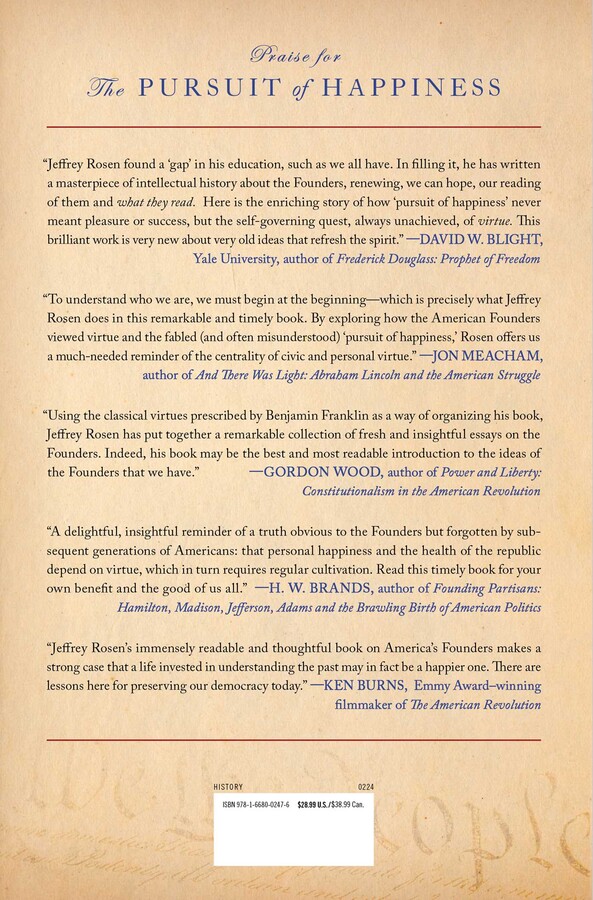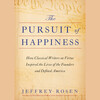Plus, receive recommendations and exclusive offers on all of your favorite books and authors from Simon & Schuster.
The Pursuit of Happiness
How Classical Writers on Virtue Inspired the Lives of the Founders and Defined America
Table of Contents
About The Book
The Declaration of Independence identified “the pursuit of happiness” as one of our unalienable rights, along with life and liberty. Jeffrey Rosen, the president of the National Constitution Center, profiles six of the most influential founders—Benjamin Franklin, George Washington, John Adams, Thomas Jefferson, James Madison, and Alexander Hamilton—to show what pursuing happiness meant in their lives.
By reading the classical Greek and Roman moral philosophers who inspired the Founders, Rosen shows us how they understood the pursuit of happiness as a quest for being good, not feeling good—the pursuit of lifelong virtue, not short-term pleasure. Among those virtues were the habits of industry, temperance, moderation, and sincerity, which the Founders viewed as part of a daily struggle for self-improvement, character development, and calm self-mastery. They believed that political self-government required personal self-government. For all six Founders, the pursuit of virtue was incompatible with enslavement of African Americans, although the Virginians betrayed their own principles.
The Pursuit of Happiness is more than an elucidation of the Declaration’s famous phrase; it is a revelatory journey into the minds of the Founders, and a deep, rich, and fresh understanding of the foundation of our democracy.
Excerpt
Notes on Cicero’s Tusculan Disputations
This morning haze obscures the firmament
Sunlight and clouds in serried blue alloy
A narrow clearing opens, fortune sent
I glimpse a sparkling sun beam and feel joy
Stoics praise calm joy without elation
Its motion placid and to reason aligned
When it transports with wanton exultation
It fires the perturbations of the mind
The four disordered passions are emotions
That lack the moderation reason brings
Elation, lust, fear, grief are their commotions
Prudence and temperance are their golden rings
The soul that’s tranquil, calm, restrained, at rest
The happy soul, the subject of our quest
Reading Group Guide
Get a FREE ebook by joining our mailing list today! Plus, receive recommendations for your next Book Club read.
By Jeffrey Rosen
Discussion Questions
1. Benjamin Franklin developed a “spiritual accounting system” to track his adherence to thirteen virtues. If you had to develop a list of practices & values that are important to you, which would you select?
2. Using Franklin’s chart on page 22, put an x mark next to each of the thirteen virtues you fell short of today. Can you improve by daily self-accounting? Discuss.
3. In adding humility at the end of his list of thirteen virtues, Franklin gave the example “Imitate Jesus and Socrates.” What do the classical and Christian traditions say about humility? Where do the two wisdom traditions agree and disagree?
4. Each of the chapters begins with a sonnet summing up the wisdom of the ancient philosophers who inspired the Founders. From the classical philosophers to the Bhagavad Gita, all the sonnets explore the importance of self-mastery, emotional temperance, moderation of thought and speech, and tranquility of mind. What do you make of the similarities and differences among the wisdom traditions?
5. The Spectator was a London magazine that deeply influenced Benjamin Franklin. Essays in the Spectator opened with a quote from a Roman poet or philosopher. Rosen, too, begins each chapter with a verse from the Classical period. What does this editorial decision accomplish? What is the relationship between each verse and its associated chapter?
6. Rosen describes the marriage between John and Abigail Adams as “a true intellectual and romantic friendship.” How did John and Abigail push one another to self-improvement?
7. Cicero wrote The Tusculan Disputations following the death of his daughter. Here, Cicero describes moral philosophy as “the medicine of our souls” (p. 92). Does Cicero believe that suffering is necessary for virtue, virtue is necessary to endure suffering, or both?
8. On p. 100, Francis Hutcheson says the rights of conscience are “unalienable” because we can’t command ourselves to think as we or anyone else pleases and because transferring the right to freedom of thought to government would not serve any valuable purpose. Do you agree? Why did he insist that the right to pursue happiness was also an unalienable right?
9. How did Phillis Wheatley's experience as an enslaved person inform her creative work?
10. In her ode to David Worcester, Phillis Wheatley writes, “Let virtue reign—And thou accord our prayers / Be victory our's, and generous freedom theirs” (p. 130). In this poem, to whom does “our” and “they” refer? What does this tell us about the intended audience for Phillis Wheatley's poems?
11. As Commander of the Continental Army, George Washington pacified a brewing mutiny at Newburgh. How did he manage to calm his troops? How would you describe his leadership style?
12. As a teenager, George Washington studied a 1734 poem from the Gentleman’s Magazine called “True Happiness.” The poem advises the reader to pursue “A merry night without much drinking / A happy thought without much thinking” (p. 155). What are the risks of “too much” thinking and other “perturbations of the mind”?
13. In 1787, Madison predicted that America's vast geography and large population would prevent passionate mobs from mobilizing. Their dangerous energy would burn out before it could inflame others, he reasoned. What, if anything, did Madison's theory get wrong?
14. Thomas Jefferson created his own version of the Bible by copying selections from the New Testament that he felt represented the pure moral teachings of Jesus. Jefferson omitted all sections that he felt represented the “corruptions” and “mysticisms” of his followers. How did Jefferson believe that faith is compatible with reason?
15. Thomas Jefferson was a slave-owner who, records show, understood that slavery was in direct conflict with the classical virtues he believed in. As you reflect on Jefferson's legacy, do you believe it's possible to separate his ideas from his actions? Explain.
16. On p. 207, Rosen distills the core message of the Bhagavad Gita. Turn to that page, and discuss.
17. John Quincy Adams constantly chastised himself for falling short of his own standards of perfection in mastering his own speech, thoughts, and actions. Was he too hard on himself? When does the quest for moral perfection lead to self-recrimination and anxiety rather than happiness?
18. According to Frederick Douglass, happiness is achieved through “useful work,” rather than from simple hedonistic activities. Why is this the case, according to Douglass? Discuss the relationship between industry and happiness.
19. Why, according to Louis Brandeis, is privacy necessary for the pursuit of happiness?
20. The Founders believed that personal self-government is necessary for political self- government. Why? What happens to a Republic when citizens and leaders fail to control themselves?
Product Details
- Publisher: Simon & Schuster (February 13, 2024)
- Length: 368 pages
- ISBN13: 9781668002476
Browse Related Books
Raves and Reviews
"With insight and wit, legal scholar Rosen shows how classical philosophy inspired the Founders. . . . Rosen's noteworthy book offers a better understanding of philosophy and American history."
– Booklist
"[A] fast-paced romp through early American political thought. . . . An entertaining window on the American founders’ reading lives."
– Publishers Weekly
"A study of the Founding Fathers’ search for self-mastery. . . . In their distinguishing between being good from feeling good, the founders, Rosen hopes, may inspire readers to redefine the meaning of a good life. A thoughtful rendering of America’s history."
– Kirkus Reviews
“Jeffrey Rosen found a ‘gap’ in his education, such as we all have. In filling it he has written a masterpiece of intellectual history about the Founders, renewing, we can hope, our reading of them and what they read. Here is the enriching story of how ‘pursuit of happiness’ never meant pleasure or success, but the self-governing quest, always unachieved, of virtue. This brilliant work is very new about very old ideas that refresh the spirit.”
– David W. Blight, Yale University, author of Frederick Douglass: Prophet of Freedom
“To understand who we are, we must begin at the beginning—which is precisely what Jeffrey Rosen does in this remarkable and timely book. By exploring how the American Founders viewed virtue and the fabled (and often misunderstood) ‘pursuit of happiness,’ Rosen offers us a much-needed reminder of the centrality of civic and personal virtue.”
– Jon Meacham, author of And There Was Light: Abraham Lincoln and the American Struggle
“Using the classical virtues prescribed by Benjamin Franklin as a way of organizing his book, Jeffrey Rosen has put together a remarkable collection of fresh and insightful essays on the Founders. Indeed, his book may be the best and most readable introduction to the ideas of the Founders that we have.”
– Gordon Wood, author of Power and Liberty: Constitutionalism in the American Revolution
“A delightful, insightful reminder of a truth obvious to the Founders but forgotten by subsequent generations of Americans: that personal happiness and the health of the republic depend on virtue, which in turn requires regular cultivation. Read this timely book for your own benefit and the good of us all.”
– H.W. Brands, author of Founding Partisans: Hamilton, Madison, Jefferson, Adams and the Brawling Birth of American Politics
“Jeffrey Rosen’s immensely readable and thoughtful book on America’s founders makes a strong case that a life invested in understanding the past may in fact be a happier one. There are lessons here for preserving our democracy today.”
– Ken Burns, Emmy Award-winning filmmaker of The American Revolution
"The Founders had no internet to educate them, but they did have advice books, contemporary and ancient. Jeffrey Rosen guides us through them to see what the Founders meant by happiness, and how they hoped to secure it. And, he suggests, we could do the same today."
– Richard Brookhiser, author of Give Me Liberty: A History of America's Exceptional Idea
Resources and Downloads
High Resolution Images
- Book Cover Image (jpg): The Pursuit of Happiness Hardcover 9781668002476
- Author Photo (jpg): Jeffrey Rosen Photograph by Bill Fraser(0.1 MB)
Any use of an author photo must include its respective photo credit














